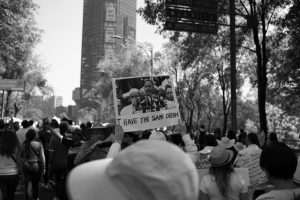In the Name of Religion is not “In Jesus’ Name”
Our hearts break at the loss of life and pain, following last Sunday’s violent act of hate which killed a London family. Islamophobia seems to have motivated the driver. That this would happen to anyone is deeply tragic. The experience is made that much more horrific as news reports circulate describing the perpetrator as being from a family that is very “devote in their Christian faith.” I’m not blaming the parents for the actions of the son, however, I am asking what happened? What happened that would cause someone, purportedly a follower of the Prince of Peace, to act with such hate and violence toward other human beings?
How does it make us feel when a person’s religion is considered among the contributing factors to a hate crime?
This story is jarring for me. I have spent the major part of my life inviting people to learn more about Jesus and his ways, and ultimately to follow him as he continues to teach us the truth about the Kingdom of God. Church has always been a part of that journey for me, sitting together, listening to scripture and to one another, sharing our lives as fellow strugglers in the faith.
Yet this rocks me to the core! Not because I never thought it could happen, but because it seems to be happening all too often. “Bible believing” “good Christians” are in the news, not for the compassion we hope we show the world, but for expressions of hate toward individuals and judgments toward various segments of society.
Religion has added to the divisions that are tearing apart our humanity, rather than being the healing agent our Christian faith is meant to be.
The church should never be a participant in the whispering of insults, or the shouting of racial slurs in public toward anyone! And yet there are some who claim their faith calls forth such ugly acts of cruelty and division, towards Blacks and Asians, persons in the LGBTQ community and its allies, persons with mobility challenges and those up front about their mental health, and other needs.
The golden rule, the beatitudes, the prayer of our Lord for every one of his followers, the witness of Jesus before Pilate, the commissioning of Peter, the call of Paul, the acceptance of the Samaritan woman, Jesus’ healing of those deemed possessed by demons, David’s public confessions of sin, and his songs of praise for God’s deliverance, the kindness shown by a Samaritan toward his ‘enemy’, Jesus welcome of Levi and acceptance of hospitality from known ‘sinners’, Jesus’ gratitude for acts of kindness shown to him by those the religious folk ridiculed and rejected.
At no time are we taught to hate, ridicule, diminish or devalue another human being. Watching and listening to Jesus, we learn how to love, welcome, embrace, encourage, lift up, hold up, and rejoice in each other’s gifts, and the gift every person is to this world and God. Because they, like us, are made in the image of God.
If you feel a church has ever given you reason to hurt, hate or think less of anyone no matter what that reason, hear me — it wasn’t Christ’s Church, it wasn’t behaving like it, it wasn’t modelling the way of Jesus.
If you’ve gotten anything at all out of following Christ, if his love has made any difference in your life, if being in a community of the Spirit means anything to you, if you have a heart, if you care—then do me a favour: Agree with each other, love each other, be deep-spirited friends. Don’t push your way to the front; don’t sweet-talk your way to the top. Put yourself aside, and help others get ahead. Don’t be obsessed with getting your own advantage. Forget yourselves long enough to lend a helping hand.
Think of yourselves the way Christ Jesus thought of himself. He had equal status with God but didn’t think so much of himself that he had to cling to the advantages of that status no matter what. Not at all. When the time came, he set aside the privileges of deity and took on the status of a slave, became human! Having become human, he stayed human. It was an incredibly humbling process. He didn’t claim special privileges. Instead, he lived a selfless, obedient life and then died a selfless, obedient death—and the worst kind of death at that—a crucifixion.
Because of that obedience, God lifted him high and honoured him far beyond anyone or anything, ever, so that all created beings in heaven and on earth—even those long ago dead and buried—will bow in worship before this Jesus Christ, and call out in praise that he is the Master of all, to the glorious honour of God the Father.” (Philippians 2:1-11)
Pastor Craig

